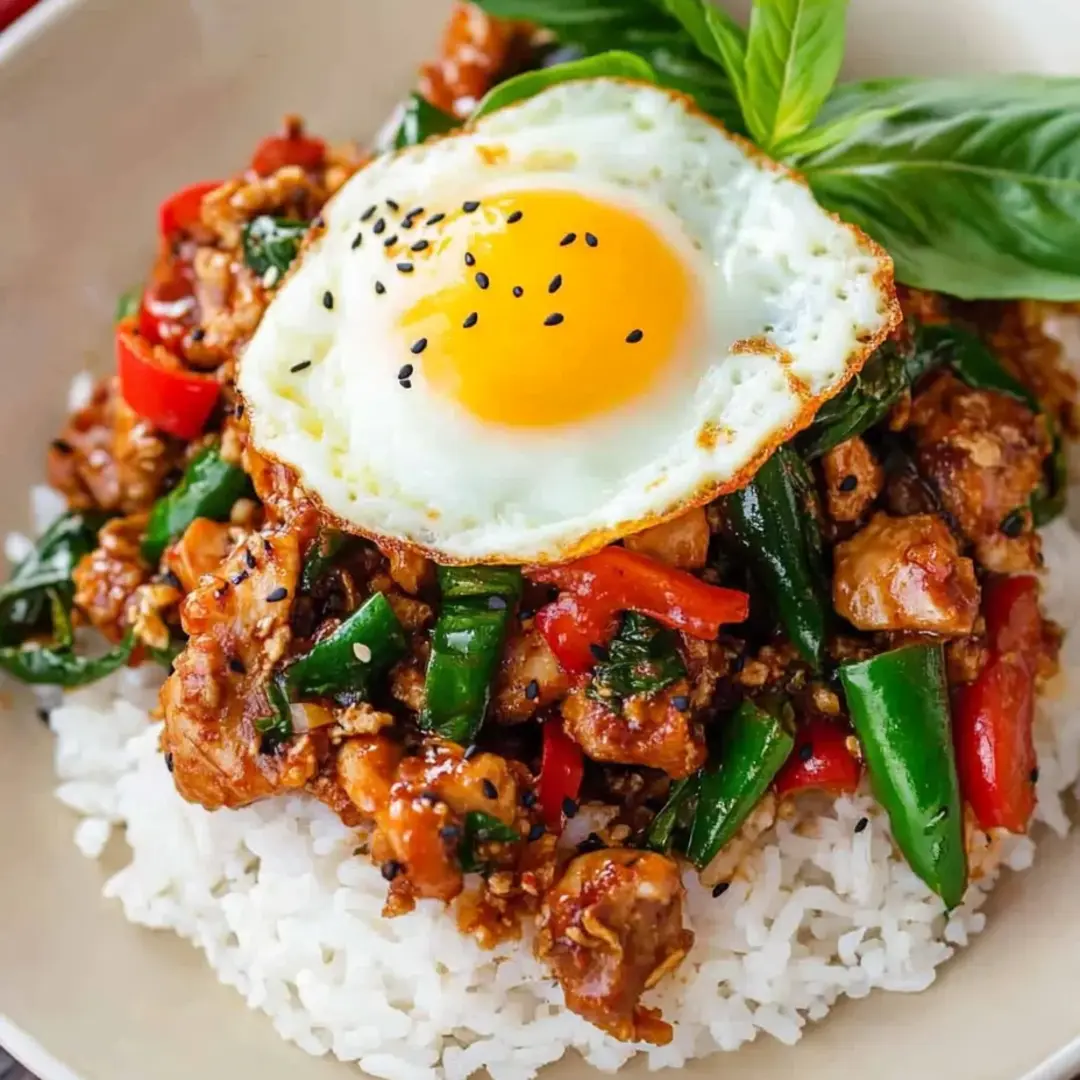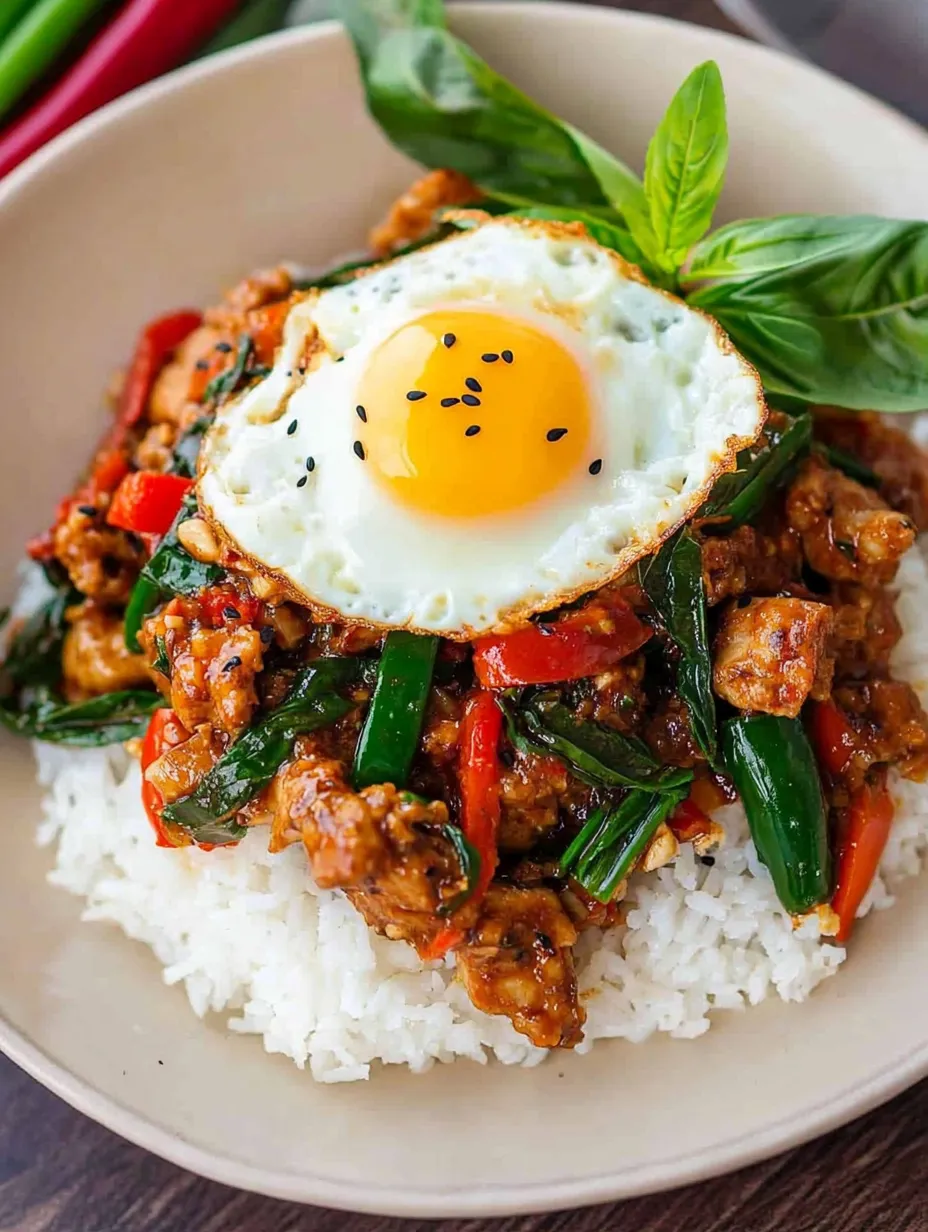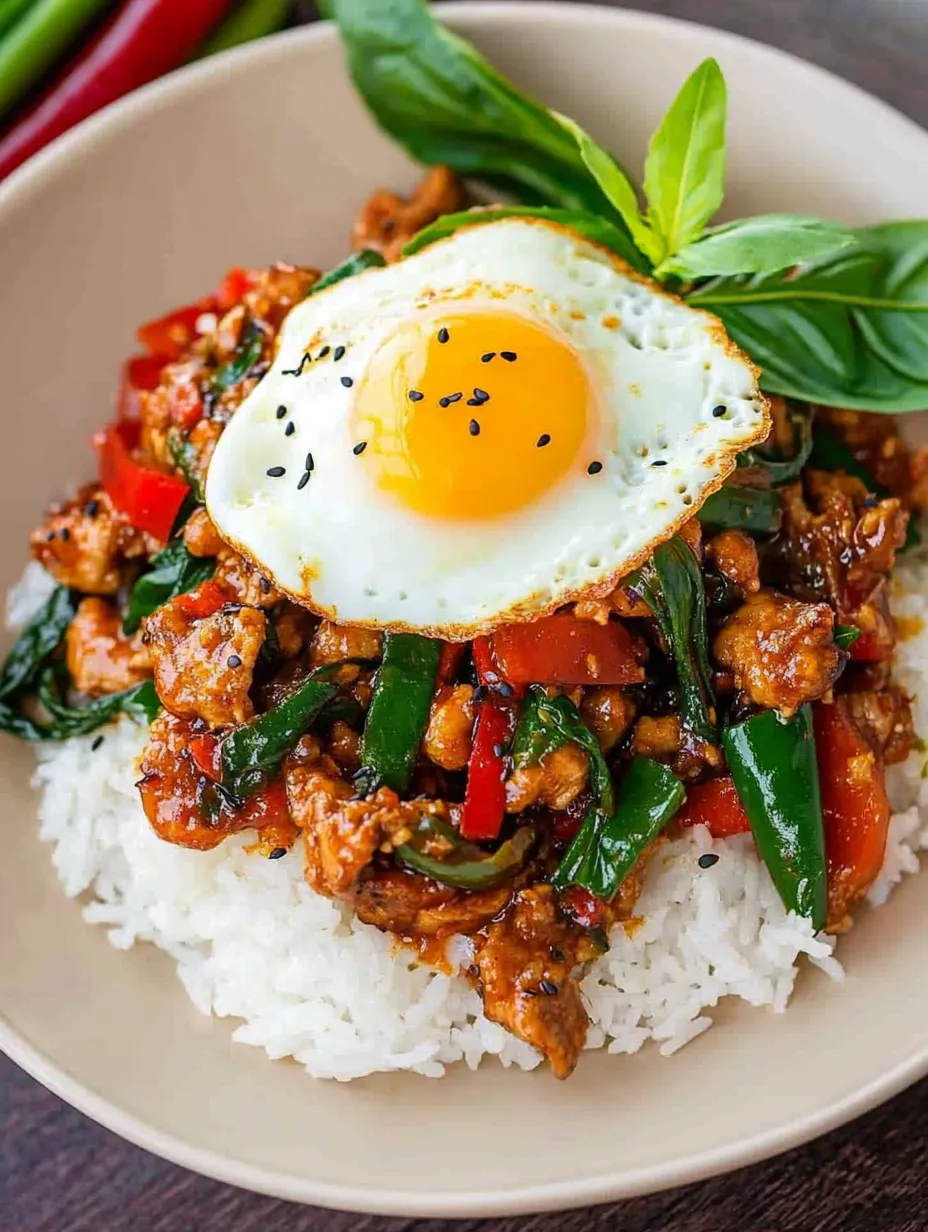 Pin it
Pin it
Thai basil chicken delivers an explosion of authentic flavors in a fraction of the time it takes to order takeout. This simplified version of Pad Gai Krapow brings together aromatic basil, savory ground chicken, and a perfect balance of sauces to create a dish that's salty, garlicky, and just spicy enough to wake up your taste buds. The fragrant basil leaves wilt into the hot mixture, releasing their distinctive aroma and creating a dish that feels like it came straight from a Thai restaurant kitchen. Best of all, this beginner-friendly recipe requires minimal ingredients and just one pan, making it the perfect solution for busy weeknights when you crave bold flavors without the fuss.
I first discovered this recipe during a particularly busy season when takeout had become an expensive habit. The first time I made it at home, I was genuinely surprised at how quickly it came together – and even more surprised when my typically picky partner went back for seconds! Now it's firmly established in our weeknight rotation, the recipe I turn to whenever we need a flavor-packed dinner without spending hours in the kitchen. It's become so reliable that I even make it for dinner guests who always leave impressed, never realizing how simple it was to prepare.
Essential Ingredients
- Ground chicken: Creates the hearty protein base of the dish. Look for lean ground chicken that's pink and fresh-looking. Ground turkey or even crumbled firm tofu work beautifully as substitutes.
- Basil: The star ingredient that gives the dish its distinctive flavor. While Thai holy basil is traditional, regular sweet basil or Thai basil are excellent alternatives that are more readily available in standard grocery stores.
- Garlic: Provides essential aromatic foundation. Fresh cloves yield the most vibrant flavor, but pre-minced works in a pinch for even faster preparation.
- Chilies: Add customizable heat to balance the savory elements. Adjust the type and quantity based on your preferred spice level – from mild bell peppers to fiery Thai bird's eye chilies.
- Soy sauce: Forms the salty base of the sauce. Low-sodium varieties allow better control of the final flavor.
- Oyster sauce: Contributes rich umami depth and slight sweetness. Vegetarian mushroom-based versions are available as substitutes.
- Fish sauce: Delivers that distinctive Thai flavor dimension. Just a small amount provides tremendous depth without making the dish taste fishy.
- Chili garlic sauce: Adds balanced heat and garlicky punch. This convenient ingredient brings multiple flavor elements in one jar.
 Pin it
Pin it
Detailed Cooking Instructions
- Step 1:
- Prepare your aromatics properly – Begin by finely mincing 4-5 garlic cloves and 1-2 chilies (depending on your heat preference). Cutting these ingredients small ensures they'll distribute evenly throughout the dish, infusing every bite with flavor without leaving large, overwhelming pieces. For maximum convenience, use a garlic press for the garlic and carefully mince the chilies, removing seeds if you prefer less heat. Keep these prepared aromatics in a small bowl, ready to go.
- Step 2:
- Heat your pan to the perfect temperature – Place a large non-stick skillet or wok over medium-high heat and add 2 tablespoons of neutral oil like vegetable or canola. The pan is ready when the oil shimmers slightly but isn't smoking. This proper preheating ensures your ingredients sear rather than steam, developing deeper flavor.
- Step 3:
- Build your flavor base – Add ¼ cup chopped onions or shallots to the hot oil and sauté for 2-3 minutes until they begin to soften and turn translucent. Then add your prepared garlic and chilies, stirring constantly. This aromatic foundation only needs about 30 seconds to become fragrant – cooking any longer risks burning the garlic, which would impart bitterness to the finished dish.
- Step 4:
- Cook the chicken with precision – Add 1 pound of ground chicken to the fragrant oil, using a wooden spoon or spatula to break it into small pieces as it cooks. Continue cooking for 4-5 minutes, stirring frequently, until the chicken is just cooked through with no pink remaining. The goal is juicy chicken that's fully cooked but not overcooked and dry. The smaller pieces will integrate better with the sauce and basil for perfect bites.
- Step 5:
- Create the signature sauce – Once the chicken is cooked, add 2 tablespoons low-sodium soy sauce, 1 tablespoon oyster sauce, 1 teaspoon fish sauce, and 1-2 teaspoons chili garlic sauce (adjust according to your heat preference). Stir to coat the chicken evenly, allowing the sauces to create a slight glaze. If the mixture seems dry, add 2-3 tablespoons of water or chicken broth to create more sauce without increasing the saltiness.
- Step 6:
- Incorporate the basil properly – Turn off the heat and add 1-1½ cups of fresh basil leaves to the hot mixture. Gently stir until the basil wilts from the residual heat, which should take less than a minute. This technique preserves the basil's vibrant color and aromatic qualities. The basil should look softened and glossy but still maintain its bright green color rather than turning dark and overcooked.
- Step 7:
- Balance flavors before serving – Taste and adjust seasonings if needed. If it's too salty, add a squeeze of fresh lime juice; if it needs more depth, add a touch more oyster sauce; if you desire more heat, stir in additional chili garlic sauce. These final adjustments ensure a perfectly balanced dish tailored to your preferences.
- Step 8:
- Serve with thoughtful accompaniments – Spoon the basil chicken over freshly steamed jasmine rice, which provides the perfect neutral base to absorb the flavorful sauce. For an authentic touch, top with a Thai-style fried egg – cooked in hot oil until the edges are crispy while the yolk remains runny. The egg adds richness and creaminess that complements the savory chicken beautifully.
Simple Variations to Keep It Interesting
While the basic recipe is perfect as is, you can create endless variations to keep this dish in regular rotation without boredom. For extra vegetables, add finely diced bell peppers and green beans during the last few minutes of cooking the chicken. Mushrooms make a wonderful addition, contributing earthy flavors that complement the aromatic basil.
For a more substantial meal, serve over rice noodles instead of jasmine rice, or wrap the filling in lettuce leaves for a lower-carb option. Vegetarians can substitute crumbled firm tofu or tempeh for the chicken while maintaining all the bold flavors of the original dish.
If you enjoy extra crunch, consider topping your finished dish with crushed roasted cashews or peanuts. A sprinkle of thinly sliced green onions adds freshness, while a wedge of lime on the side allows diners to add brightness to taste.
 Pin it
Pin it
Make-Ahead and Serving Tips
This dish comes together so quickly that make-ahead preparation is rarely necessary, but you can still streamline the process when time is tight. Chop all aromatics (garlic, chilies, and onions) up to two days ahead and store in an airtight container in the refrigerator. Combine the sauce ingredients in a small jar and refrigerate for up to a week, shaking well before using.
The basil chicken itself reheats beautifully, making it perfect for lunch meal prep. Store leftovers in airtight containers in the refrigerator for 2-3 days. When reheating, add a splash of water or chicken broth to the pan to refresh the sauce if it seems dry. The basil will darken slightly but will still taste delicious.
For an impressive dinner party presentation, serve family-style in a large shallow bowl with the rice as a base, the basil chicken spooned over top, and fried eggs crowning the arrangement. Place small dishes of additional toppings like crushed peanuts, sliced chilies, and lime wedges around the main dish to allow guests to customize their portions.
Understanding the Different Types of Basil
The choice of basil significantly impacts this dish's final flavor profile. Traditional Pad Gai Krapow uses holy basil (bai krapow), which has a peppery, clove-like flavor with hints of spice. This variety can be challenging to find outside specialty Asian markets.
Thai basil, with its purple stems and anise-like flavor, is more commonly available and makes an excellent substitute. The licorice notes add complexity that works beautifully in this dish.
Regular sweet basil, found in most grocery stores, is the most accessible option. While milder than its Thai counterparts, it still imparts wonderful aromatic qualities that harmonize with the other ingredients. For an interesting twist, try mixing sweet basil with a small amount of fresh mint to create a flavor profile closer to Thai basil.
I've discovered that adding a teaspoon of palm sugar or brown sugar to the sauce creates a subtle sweetness that balances the salty and spicy elements beautifully. The first time I tried this variation for dinner with friends, everyone immediately asked for the recipe, commenting on the perfect balance of flavors!
My final thought on this Thai basil chicken is that it perfectly demonstrates how home cooking can rival restaurant favorites with significantly less time, expense, and fuss than you might expect. There's something deeply satisfying about creating such vibrant flavors in your own kitchen in less time than it takes for delivery to arrive. Whether you're an experienced cook or just beginning your culinary journey, this recipe offers that rare combination of simplicity and impression – a dish that feels special enough for company but easy enough for a Wednesday night when you're cooking on autopilot after a long day.
Frequently Asked Questions
- → What's the difference between Thai basil and regular basil?
- Thai basil (holy basil or 'bai gaprow') has a more pronounced anise or licorice flavor and holds up better in cooking than regular Italian basil. While regular basil can be substituted, the dish will have a slightly different flavor profile. Look for Thai basil in Asian grocery stores for the most authentic taste.
- → Can I use a different protein instead of ground chicken?
- Absolutely! This dish works well with ground pork, turkey, beef, or even crumbled tofu for a vegetarian version. The cooking technique remains the same, though cooking times may vary slightly depending on your choice of protein.
- → How can I adjust the spice level?
- To make it milder, reduce or omit the chilies and use less chili sauce. For a spicier version, increase the amount of fresh chilies, add some dried chili flakes, or use more chili sauce. You can also serve it with extra Sriracha on the side for individual heat adjustment.
- → Are there gluten-free substitutions for the sauce ingredients?
- Yes, use gluten-free soy sauce (tamari), gluten-free oyster sauce (look for dedicated gluten-free brands), and ensure your fish sauce is gluten-free (most are naturally). Always check labels as ingredients can vary between brands.
- → Why is the fried egg traditionally served with this dish?
- The fried egg is a classic component that adds richness and creaminess to balance the spicy, savory flavors of the dish. The runny yolk creates a natural sauce that enhances the flavor of both the meat mixture and the rice. While optional, it's highly recommended for an authentic experience.
